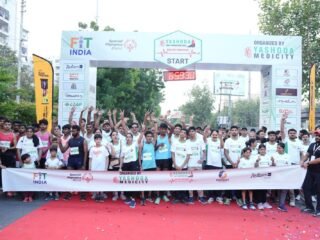New Delhi, 17 December 2024: In a groundbreaking revelation, Union Minister Dr. Jitendra Singh recently unveiled a significant study conducted by the Research Society for the Study of Diabetes in India (RSSDI). The study explores the role of yoga in preventing and managing diabetes, highlighting its effectiveness as a natural and holistic intervention. This report has sparked hope for millions grappling with diabetes or at risk of developing it, especially given the rising burden of the disease in India.
Dr. Jitendra Singh, while releasing the report, emphasized the need for integrating traditional practices like yoga with modern medicine to address the growing diabetes epidemic in the country. As diabetes remains one of India’s most significant public health challenges, the findings of this study could pave the way for a broader acceptance of yoga in preventive healthcare.
Diabetes in India: A Growing Concern
India, often referred to as the “Diabetes Capital of the World,” is witnessing an alarming rise in the number of diabetes cases. According to recent statistics, over 77 million people in India live with diabetes, and this figure is projected to increase significantly in the coming years. Factors such as sedentary lifestyles, poor dietary habits, stress, and genetic predisposition contribute to this surge.
Type 2 diabetes, the most common form, often develops gradually due to lifestyle choices and metabolic imbalances. It not only affects blood sugar levels but can also lead to severe complications such as heart disease, kidney failure, vision loss, and nerve damage. Preventive strategies are crucial, and the new RSSDI study sheds light on how yoga can play a role in addressing this pressing issue.
Key Findings of the RSSDI Study on Yoga and Diabetes
The RSSDI study is among the first to scientifically establish a connection between yoga practices and diabetes prevention. The research team examined individuals across various age groups and risk categories, focusing on how regular yoga practice impacts blood sugar levels, insulin sensitivity, and overall metabolic health.
Some of the study’s key findings include:
Improved Blood Sugar Control: Regular yoga practice was found to lower fasting blood sugar levels and post-meal glucose spikes. Yoga helps improve pancreatic function, facilitating better insulin production and utilization in the body.
Enhanced Insulin Sensitivity: Yoga postures combined with breathing exercises enhance the body’s sensitivity to insulin, reducing insulin resistance – a significant factor in the development of Type 2 diabetes.
Weight Management: Obesity and being overweight are primary risk factors for diabetes. The study showed that yoga helped participants achieve gradual and sustainable weight loss, particularly reducing abdominal fat, which is closely linked to diabetes.
Reduced Stress Levels: Chronic stress can lead to hormonal imbalances, triggering high blood sugar levels. The practice of yoga promotes relaxation, reduces cortisol levels, and fosters mental well-being, indirectly benefiting blood glucose regulation.
Overall Fitness and Lifestyle Improvement: The RSSDI study revealed that individuals who practiced yoga regularly adopted healthier lifestyles, including better eating habits, improved sleep patterns, and increased physical activity.
These findings underscore the holistic nature of yoga, which not only focuses on physical fitness but also improves mental and emotional well-being – key components in diabetes management.
Why Yoga Is Effective in Preventing the Condition
The success of yoga in preventing diabetes lies in its ability to address multiple factors simultaneously. Unlike intensive workout regimens, yoga is a low-impact activity suitable for all age groups, including those with mobility restrictions.
Yoga asanas (postures) such as Paschimottanasana (Seated Forward Bend), Vrikshasana (Tree Pose), and Bhujangasana (Cobra Pose) activate the body’s metabolism, stretch muscles, and stimulate internal organs like the pancreas and liver. These organs play a critical role in glucose regulation and detoxification.
Additionally, pranayama (breathing exercises) such as Anulom-Vilom and Bhastrika help regulate the autonomic nervous system, reduce oxidative stress, and improve oxygen flow, which directly benefits metabolism. The meditative aspect of yoga further helps manage stress, which is often an overlooked trigger for diabetes.
A Call for Integrating Yoga into Daily Life
Union Minister Dr. Jitendra Singh, while discussing the study, emphasized that yoga should not be seen as an alternative to modern medicine but as a complementary practice. He urged citizens to incorporate yoga into their daily lives to prevent lifestyle diseases like diabetes.
“India is not only the birthplace of yoga but now has the scientific backing to prove its benefits. With diabetes emerging as a silent pandemic, we need to combine our rich traditional knowledge with evidence-based approaches,” Dr. Singh remarked.
Health experts have also echoed this sentiment, emphasizing that adopting yoga early in life can prevent the onset of high blood sugar and other lifestyle disorders. For those already diagnosed, combining yoga with prescribed medication, a balanced diet, and regular monitoring can significantly improve their quality of life.
The RSSDI’s study on yoga and high blood sugar prevention has reaffirmed the potential of this ancient practice in combating modern health challenges. As India battles the rising prevalence of high blood sugar, the integration of yoga into daily routines could serve as a cost-effective and sustainable solution for millions.
Dr. Jitendra Singh’s release of the landmark study not only highlights India’s leadership in holistic healthcare but also encourages individuals to take proactive steps toward their health. Yoga, with its proven benefits for both body and mind, offers a ray of hope in preventing high blood sugar and promoting overall wellness.
For those seeking to make meaningful lifestyle changes, incorporating yoga every morning could be the first step toward healthier, diabetes-free living.






